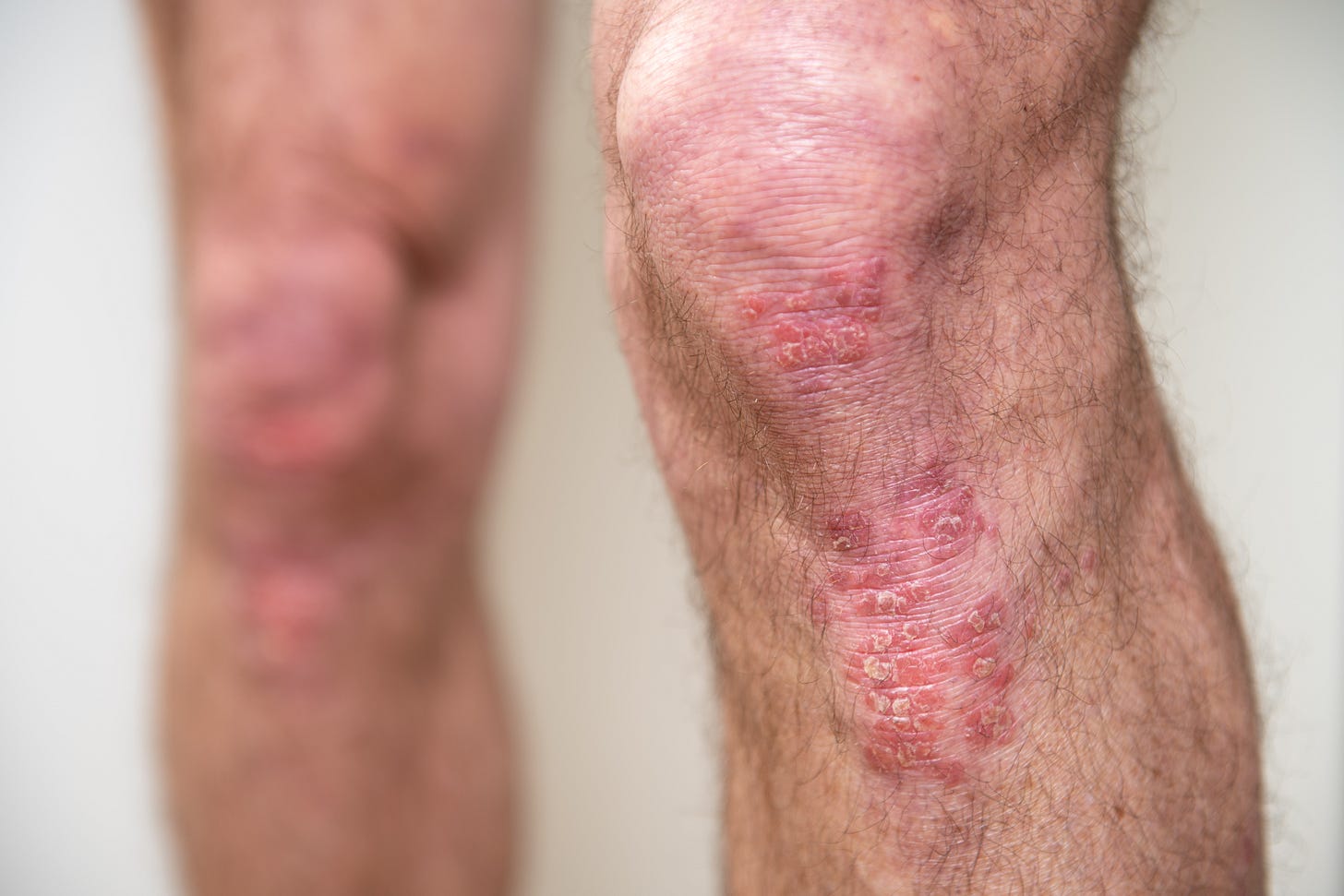Predictors of severity in paradoxical psoriasis from biologic therapies
Today’s report also covers adverse effects of anti-interleukin-23 agents, risk factors for diagnosis of PsA, PsO, RA and AS, and more (1,400 words, 7 minutes 10 seconds)
The Vender on Psoriasis e-newsletter is supported by an unrestricted grant from Sun Pharma Canada
Good morning and welcome to the third issue of Special Reports: Skin Spectrum Weekly presents “Vender on Psoriasis.” This series is based on Dr. Vender’s popular column appearing in each edition of The Chronicle of Skin & Allergy, which offers expert commentary and opinions on current clinical developments in PsO. We’d love to get your feedback and suggestions and invite you to be in touch. Please write to us at health@chronicle.org

This research letter from Canadian investigators reports that awareness of the increased risk of severe paradoxical reactions with adalimumab may help clinicians make a rapid diagnosis as further data emerges. The study was published online in the Journal of the American Academy of Dermatology (June 16, 2022).
Paradoxical psoriasis occurs in 2 to 5% of patients receiving tumour necrosis factor-α (TNFi) therapy for pre-existing psoriasis, inflammatory bowel disease (IBD) and inflammatory arthritis. The authors say that paradoxical psoriasis is thought to represent a pleomorphic interferon response, but that the risk factors are poorly understood. They conducted a systematic review of paradoxical psoriasis from biologics used in the treatment of psoriasis and its associated inflammatory diseases, to try to identify associations with severe reactions.
The authors searched all study types on MEDLINE and EMBASE from inception to June 22, 2021, for paradoxical reactions to biologics that were determined to be paradoxical psoriasis by a dermatologist and/or supported by histology. Data on age, sex, history of PsO, indication for exposure, biologic type, duration of exposure, immunomodulator use and publication year of the papers was analyzed. The outcome of interest was development of severe reactions, defined as paradoxical pustulosis, scalp involvement with alopecia and/or generalized psoriasis.
Database searches yielded 4,900 articles after de-duplication; 4,674 were excluded by abstract and 226 articles with 391 cases were eligible, with 303 containing outcomes of interest (S1). Meta-regression demonstrated that adalimumab alone was associated with severe paradoxical psoriasis relative to etanercept (OR 3.25, 95% CI 1.21 to 8.71; S2), as well as all TNFi, combined (OR 2.49, 95% CI 1.11 to 5.58, S2). The authors also noted that increasing age at reaction onset as a continuous variable (years) was inversely associated with reaction severity (increase of 10-years OR 0.73, 95% CI 0.54 to 69 0.97 increase of 25-years OR 0.44, 95% CI 0.22 to 0.93 S2).
Adalimumab was associated with severe reactions relative to etanercept and all TNFi, combined, despite the highest frequency of infliximab use (51% (n=142/277); adalimumab 28%, n=78/277). The risk of developing a severe reaction was ~2.5 times higher for adalimumab than all other biologics, with indications for therapy primarily being inflammatory arthritis (41.2%), IBD (40%) and psoriasis (16.5%). Older age was also associated with lower risk of severe reactions: 27% less likely for a 10-year increase in age, they note.
According to the authors, potential explanations for these associations may be the relative dose frequency of adalimumab, drug formulation, as well as immunosenescence of older patients. The study was funded by the Canadian Dermatology Foundation.
Comment: Paradoxical psoriasis is a very interesting phenomenon that occurs in patients who have no history of psoriasis and are using medications for other reasons. The interesting part is that usually the medications used—such as TNF inhibitors—should prevent psoriasis and control the inflammation, but in these cases of paradoxical psoriasis patients with arthritis or inflammatory bowel disease can develop psoriasis. It is also interesting that younger age is a risk factor. Therefore, patients on anti-psoriasis medications are getting psoriasis even though it seems like they shouldn't. The reason is not discussed in this paper, however experts believe that it is because of a feedback mechanism with increasing interferon while blocking TNF from the medications.
Occasionally, these paradoxical psoriasis patients can be treated topically or with ultraviolet light and they rarely have to stop the inciting biologic. According to this study, the highest frequency of reactions seems to occur with infliximab, but the more severe reactions occur with adalimumab. So, when a patient comes to the office complaining of psoriasis despite them being on an anti-psoriatic medication, it is wise to think of a paradoxical psoriatic reaction and investigate further their underlying medical condition for the use of this TNF inhibitor. If there is no response to adjunctive therapy such as phototherapy or topical therapy, dose optimization is unlikely to work and a change in class of medication would be warranted.
Adverse effects of anti-Interleukin-23 agents in psoriasis patients
Anti-interleukin (IL)-23 agents have shown safety and efficacy in the treatment of patients with psoriasis. The importance of the IL-23 axis has been established, and therapies targeting IL-23 have set new benchmarks in psoriasis outcomes. However, adverse events have been associated with them, and this systematic review aimed to assess the adverse developments of anti-IL-23 as determined in phase III trials. The study was published in Dermatology (June 13, 2022).
In this study, Google Scholar, PubMed, Scopus, and Cochrane databases were searched to identify appropriate articles relating to adverse effects of anti-IL-23 agents, and 18 studies met the selection criteria. The most common adverse effect from anti-IL-23 agents was nasopharyngitis followed by headache, upper respiratory tract infection, and back pain. Ustekinumab and guselkumab were involved in Grade 3 adverse effects, while briakinumab, tildrakizumab, and risankizumab were significantly involved in grade 4 adverse effects.
Comment: Generally anti-IL-23 biologics used for psoriasis or psoriatic arthritis are not associated with any specific type of adverse events directly related to the class. This study shows that upper respiratory tract infections, nasopharyngitis and headaches are the most common side effects, including back pain. That’s in contrast to TNF inhibitors for which rare but significant side effects such as lupus, exacerbation of congestive heart failure, or reactivation of tuberculosis can be seen. In addition, IL-17 antibodies have concerns about candidiasis as well as potential exacerbation or development of inflammatory bowel disease. Anti-IL-23s have the least concerns of side effects of most biologics. As mentioned in the study, the common side effects that occur with all biologics are seen with anti-IL-23s, but no specific effects related to anti-IL-23 have been experienced in clinical trials or during real-world experience.

Risk factors for diagnosis of PsA, PsO, RA and AS: A set of parallel case-control studies
In this study from the Journal of Rheumatology (Aug. 2022), the authors compared potential risk factors for the diagnosis of psoriatic arthritis (PsA), psoriasis, rheumatoid arthritis (RA), and ankylosing spondylitis (AS), referencing the results of four parallel case-control studies with data obtained from the Health Improvement Network between 1994 and 2015. Patients with PsA, psoriasis, RA, or AS were identified using validated code lists and matched to controls on age, sex, practice, and year. Risk factors were selected in the time prior to diagnosis.
Patients with incident PsA (n=7,594), psoriasis (n=111,375), RA (n=28,341), and AS (n=3,253) were identified and matched to 75,930, 1,113,345, 282,226, and 32,530 controls, respectively. Median age of diagnosis was 48 (IQR 38-59), 41 (31-54), 43 (31-54), and 60 (48-71), respectively. The authors note that in the multivariable models, there were some shared and some differing risk factors across all four diseases: PsA was associated with obesity, pharyngitis, and skin infections; PsA and psoriasis were associated with obesity and moderate alcohol intake; PsA and AS were associated with uveitis; and PsA and RA were associated with preceding gout. According to the investigators, both RA and AS were associated with current smoking, former moderate drinking, anemia, osteoporosis, and inflammatory bowel disease. All shared former or current smoking as a risk factor; statin use was inversely associated with all four diseases.
Comment: Psoriasis patients have so many comorbidities to worry about it is possible that reducing risk factors associated with the development of skin or joint disease may be beneficial. Clinical studies would need thousands of patients to see if treating psoriasis or certain types of arthritis with biologics can reduce some of these risk factors. However, this paper explores risk factors for different inflammatory diseases. For example, obesity and moderate alcohol intake is associated with psoriatic arthritis and psoriasis, but this may be a chicken and egg observation. As we know, psoriasis and psoriatic arthritis can also lead to obesity and moderate alcohol intake due to a sedentary lifestyle and boredom, leaving one to indulge in alcohol. Psoriatic arthritis alone is associated with obesity and skin infections but also pharyngitis. It is well known that tonsillectomy may reduce severe psoriasis in some cases. Unfortunately, psoriasis patients, whether they have skin or joint involvement, must be aware that a healthy lifestyle of low alcohol, moderate weight reduction, smoking cessation and avoidance of infection may prevent some of these diseases.

If you find the contents of this newsletter interesting, please check out the Vender on Psoriasis podcast. It’s available at Apple iTunes, Stitcher, Spotify, or wherever you get your podcasts.
Dr. Ron Vender is a Hamilton-based certified dermatologist with 29 years of clinical practice experience and over 75 clinical trials in psoriasis. He is founder and director of Venderm Innovations in Psoriasis, a centre of excellence for Psoriasis offering a comprehensive management solution for individuals with psoriasis.
Upcoming events and learning opportunities
The annual Skin Spectrum Summit conference is coming up soon.
The Skin Spectrum Summit is dedicated to improving dermatologic care for skin of colour, recognizing that optimal care differs across skin types. It will feature presentations by Canadian and international experts.
This year’s Summit will be held in-person at the Chestnut Conference Centre in downtown Toronto. If you aren’t able to attend in-person, a livestream of the event is also available!
Date: Saturday September 17, 2022
Time: 8:00 a.m. – 4:00 p.m. EDT
Location: Chestnut Conference Centre, 89 Chestnut St., Toronto ON.
Readers of the Vender on Psoriasis news letter can receive a discount to the Skin Spectrum Summit by using the code PSORIASIS or clicking here.

Register for the 2022 Skin Spectrum Summit here:




